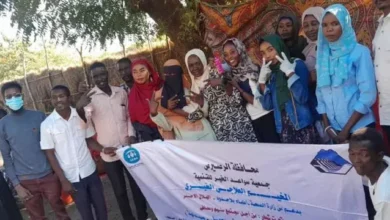Visit of the Director of the World Health Organization to Sudan: An urgent call to save a collapsed health sector – Something for the homeland – ✍️ Mr. Salah Ghariba

Sudan has recently experienced a sharp deterioration in its health situation, due to the ongoing conflict and its devastating impact on health infrastructure. The severity of the crisis has increased with the spread of diseases, epidemics and the shortage of clean water, which have directly affected the lives of citizens, especially the most vulnerable groups. In this context, the visit of the Director of the World Health Organization to Sudan highlights the magnitude of the humanitarian catastrophe suffered by the Sudanese people, and calls for concerted international efforts to provide the urgent and necessary support to save the health sector.
Reports from Sudan have shown the extent of the damage caused to the health sector by the conflict. Many hospitals and health centres have been destroyed or looted, leading to a severe shortage of medicines and medical equipment. In addition, health workers suffer from a lack of funding and training, making it more difficult to provide health services to citizens.
In these difficult circumstances, civil society and international organisations are playing a vital role in providing humanitarian assistance to people affected by the conflict. These organisations have provided medicines and medical equipment, set up mobile clinics and provided psychological support to the wounded. However, these efforts remain insufficient to address the scale of the crisis.
The health crisis in Sudan raises many questions about the legal and moral responsibility of the parties involved in the conflict. It is clear that targeting health facilities and disrupting the provision of medical services constitutes a flagrant violation of international humanitarian law. Those responsible for these crimes must therefore be held accountable and brought to justice.
To overcome this crisis, a set of urgent and long-term measures must be taken, among which ending the conflict is the first and most important step to address the health crisis. The international community must provide the necessary financial and in-kind support. rehabilitate health infrastructure and provide medicines and medical equipment, and we must work to build a system. A strong and sustainable health system depends on proper planning and effective management. The role of civil society and non-governmental organizations in providing health services to citizens must be ensured. be supported, and those responsible for violations committed against the health sector must be held accountable and brought to justice.
The visit of the World Health Organization Director to Sudan is a wake-up call for the international community to take urgent action to save the lives of millions of Sudanese. All parties concerned must cooperate to end this humanitarian crisis and provide the necessary support for the reconstruction of the health sector in Sudan.






